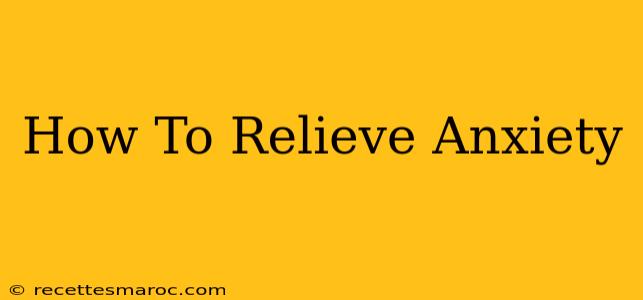Anxiety. That nagging feeling of worry, unease, or nervousness that can creep into our lives and disrupt our peace. It's a common experience, but that doesn't make it any less debilitating. Fortunately, there are many effective ways to relieve anxiety, from simple techniques you can use daily to significant lifestyle changes that promote long-term well-being. This guide explores practical strategies to help you manage and reduce your anxiety.
Understanding Your Anxiety
Before diving into solutions, it's crucial to understand the nature of your anxiety. Is it situational, stemming from a specific event or circumstance? Or is it generalized anxiety disorder (GAD), a persistent state of worry? Identifying the root cause can help you tailor your approach to managing it effectively. If you suspect you have GAD or another anxiety disorder, seeking professional help from a therapist or doctor is paramount.
Quick Anxiety Relief Techniques
These techniques can provide immediate relief when anxiety strikes:
1. Deep Breathing Exercises:
Deep, slow breaths activate the parasympathetic nervous system, counteracting the "fight or flight" response associated with anxiety. Try the 4-7-8 breathing technique: Inhale deeply for 4 seconds, hold for 7 seconds, and exhale slowly for 8 seconds. Repeat several times.
2. Progressive Muscle Relaxation:
This technique involves systematically tensing and releasing different muscle groups in your body. Starting with your toes and working your way up, tense each muscle group for a few seconds, then release, noticing the difference in tension.
3. Mindfulness Meditation:
Focusing on the present moment can help reduce overthinking and worrying about the future. Mindfulness meditation involves paying attention to your breath, body sensations, and thoughts without judgment. Even a few minutes a day can make a difference.
4. Grounding Techniques:
Grounding techniques connect you to the present moment by engaging your senses. Notice five things you can see, four things you can touch, three things you can hear, two things you can smell, and one thing you can taste.
Lifestyle Changes for Long-Term Anxiety Management
Sustained relief from anxiety often requires integrating positive lifestyle changes:
1. Regular Exercise:
Physical activity releases endorphins, natural mood boosters that can significantly reduce anxiety. Aim for at least 30 minutes of moderate-intensity exercise most days of the week. Find activities you enjoy, whether it's running, swimming, yoga, or dancing.
2. Healthy Diet:
Nourishing your body with a balanced diet rich in fruits, vegetables, and whole grains can have a profound impact on your mental well-being. Limit processed foods, sugary drinks, and excessive caffeine, all of which can exacerbate anxiety.
3. Sufficient Sleep:
Sleep deprivation can worsen anxiety symptoms. Aim for 7-9 hours of quality sleep each night. Establish a regular sleep schedule, create a relaxing bedtime routine, and optimize your sleep environment for darkness and quiet.
4. Limit Alcohol and Caffeine:
While alcohol might seem like a short-term stress reliever, it can actually worsen anxiety in the long run. Similarly, caffeine can increase feelings of nervousness and jitters. Moderation is key.
5. Social Connection:
Strong social support networks are crucial for mental health. Make time for meaningful connections with friends and family. Engage in activities that foster social interaction and belonging.
6. Cognitive Behavioral Therapy (CBT):
CBT is a type of therapy that helps you identify and challenge negative thought patterns and behaviors that contribute to anxiety. A therapist can guide you through techniques to manage your anxiety more effectively.
When to Seek Professional Help
If your anxiety is significantly impacting your daily life, interfering with your work, relationships, or overall well-being, it's essential to seek professional help. A therapist or doctor can assess your symptoms, provide a diagnosis, and recommend appropriate treatment options, which might include therapy, medication, or a combination of both. Don't hesitate to reach out for support – you don't have to navigate anxiety alone. Remember, taking proactive steps towards managing your anxiety is an investment in your mental and physical health.

